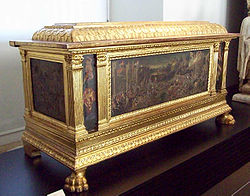- Hope chest
-
For other uses, see Hope chest (disambiguation).
A hope chest, dowry chest, cedar chest, or glory box is a chest used to collect items such as clothing and household linen, by unmarried young women in anticipation of married life.
The term "hope chest" or "cedar chest" may be used primarily by Midwestern and Southern U.S. women, while "glory box" is used by women in Australia.[citation needed] In the UK the term "bottom drawer" was most commonly used.
 Renaissance hope chest (cassone) from Florence (15th century)
Renaissance hope chest (cassone) from Florence (15th century)
Contents
Social context of a hope chest
The collection of a trousseau was a common coming-of-age rite until approximately the 1950s; it was typically a step on the road to marriage between courting a man and engagement. It wasn't always collected in a special chest, hence the alternative UK term bottom drawer, which refers to putting aside one drawer in a chest of drawers for collecting the trousseau undisturbed, but such a chest was an acceptable gift for a girl approaching a marriageable age. Such chests may have been inherited from their mother or female relatives. They are still a popular gift from woodworking fathers.
Contents of a "hope chest" or "glory box" included typical dowry items such as clothing (especially a special dress), table linens, towels, bed linens, quilts and occasionally dishware. As a bride would typically leave home on marriage, hope chests were sometimes made with an eye to portability, albeit infrequently. A 'bridal chest' was given to a bride at her wedding, by her husband, and so is not a 'hope chest' in this sense.
Historical origins
- Cassone of renaissance Italy
- Large decorated and showy chests, forming part of dynastic marriages in 15th and 16th century Italy. These were prized displays of wealth, of even more value than their contents.
- Dutch kast or German schrank chests
- These are tall wardrobe-like chests with double doors. These are larger than most hope chests, intended for regular service in the home after marriage, and so were constructed as to partially dismantle for transport.[1]
- American settlers
- The peak of the hope chest as folk art came with the waves of European immigrants to America. Many of these, from Scandinavia to the Northern Midwest and Germans in Pennsylvania, had long traditions of plainly constructed chests with extensive painted decoration.
Styles
The typical hope chest is of lidded blanket chest form. In some traditions, there may also be one or two side-by-side drawers beneath. As with blanket chests, a small till may also be found inside for small items.
Lane Company chests
“ The gift that starts the home. ” —Lane Cedar Chest co., advertising material[2]
As the contents of such a chest would primarily be linens, construction in moth-repellent cedar, or at least a cedar lining, was popular. The Lane Company of Altavista, VA (1912, closed 2001)[2] were a notable maker of cedar chests. After developing production-line techniques for making ammunition boxes during World War One, they turned these production techniques and a patent locking-mitre corner joint, into vast numbers of chests. This was aided by strong advertising, using a teenaged Shirley Temple as a model, in a campaign targeted at GIs and absentee sweethearts of World War Two. They were particularly well-known for their practice (since 1930) of distributing miniature (12" long) cedar chests to high-school girls as advertising gifts.[1] The Eastern Redcedar (Juniperus virginiana) is the "cedar" used in making moth-repelling cedar chests and drawers, as well as pencils.
Decoration
Decoration is not an intrinsic part of the hope chest, but often appears.
- Carving
- Carving was notable in the 17th and 18th century joined oak chests. The Hadley chests of Massachusetts are covered by extensive surface carving in the typical low-relief style of the period.
- Painting
- This is typically seen in the Scandinavian and German immigrant traditions and follows traditional styles.
- The elaborate gilded gesso of the cassoni was produced by skilled and expensive craftsmen. This work has not been seen since and doesn't form part of the folk tradition.
- Sulphur inlay is a rare technique in furniture and for chests it is only known for a short period. Between 1765 and around 1820, German immigrant cabinetmakers in Lancaster County, Pennsylvania used it to decorate the surface of chests. The Deitrich chest of 1783 is now in the Smithsonian.[1]
In popular culture
"Glory Box" is also the title of a song from the band Portishead. The song is about a woman who is giving up her time as a temptress to commit to a settled life with a man, asking him to take a look from her side every now and then.
In the 2005 movie Me and You and Everyone We Know,[3] the character of Sylvie collects household items described as her dowry, and stores them in a chest in her bedroom.
In the 1985 movie Back to the Future,[4] the character Lorraine McFly refers to having placed Marty McFly's pants "over there...on my hope chest" after he had been knocked unconscious. The joke implies her romantic interest in Marty where unbeknownst to Lorraine, Marty is her son from the future.
References
- ^ a b c Schleining, Lon (2003). Treasure Chests: The Legacy of Extraordinary Boxes. Taunton Press. ISBN 156158651X. http://books.google.co.uk/books?id=kOHS2418gQYC.
- ^ a b "History Corner: Lane Cedar Chests". Virginia Historical Society. http://www.vahistorical.org/publications/historycorner_lane.htm.
- ^ Miranda July (Director) (2005). Me and You and Everyone We Know (Motion picture). http://www.imdb.com/title/tt0415978/.
- ^ Michael J. Fox (Star) (1985). Back to the Future (Motion picture). http://www.imdb.com/title/tt0088763/.
External links
Categories:- Chests
- Marriage
Wikimedia Foundation. 2010.
